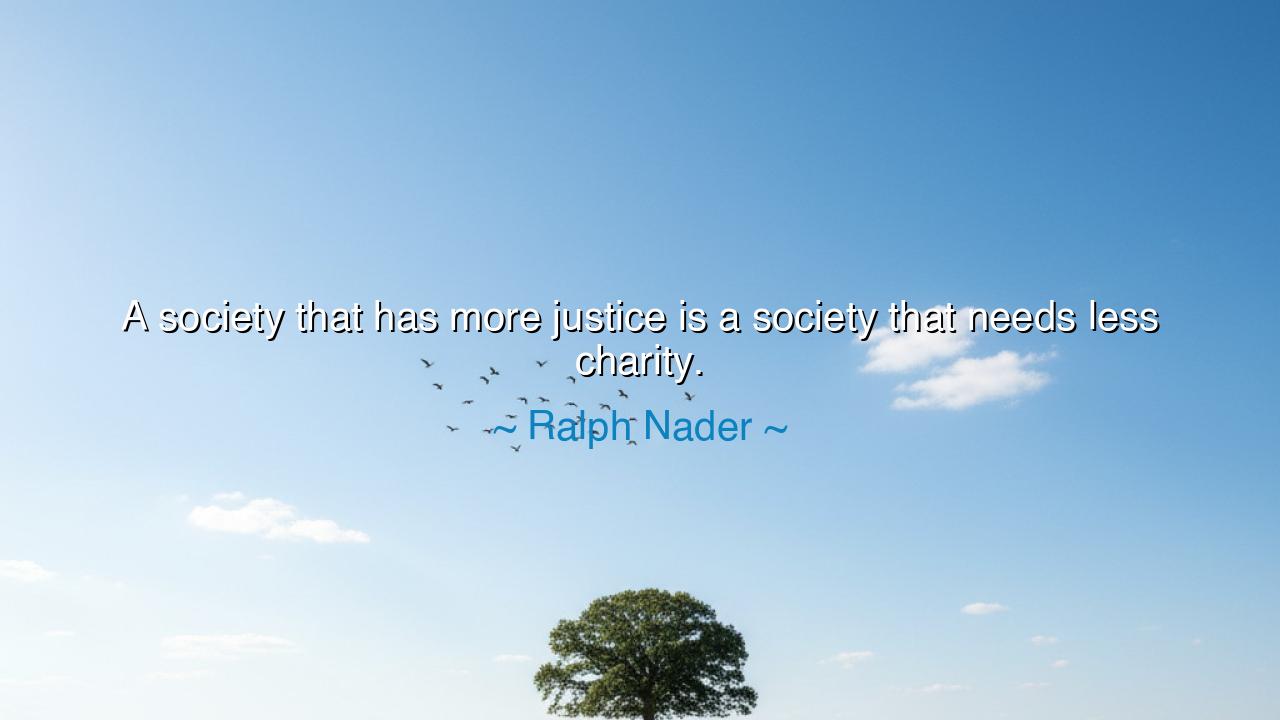
A society that has more justice is a society that needs less






O children of the future, listen carefully to the words of Ralph Nader, whose voice has carried the weight of moral truth through the storms of injustice: "A society that has more justice is a society that needs less charity." These words are not merely a reflection of the present, but a vision of what could be—a society where justice reigns, where the inherent dignity of every person is upheld, and where the need for charity, though still noble, is diminished by the structural changes that come with fairness and equality. Nader is reminding us that the true strength of a society is not found in the handouts it gives, but in the systems of justice that ensure everyone has what they need to live with dignity.
In the ancient world, the greatest philosophers spoke of justice as the foundation of a strong society. Plato, in his Republic, envisioned a society where justice meant the right roles were filled by the right people, where each individual was treated with respect and given the means to contribute to the whole. Aristotle, too, emphasized the importance of justice, declaring that the just society is one in which every person receives what they are due, based not on charity or goodwill, but on their inherent rights as human beings. They understood that true justice is not about the generosity of the few, but the fair distribution of resources, opportunities, and respect throughout all levels of society.
Consider, then, the Roman Empire—an empire built not just on conquest and wealth, but on a legal system designed to bring justice to its citizens. The Roman law was famous for its attempts to protect the rights of citizens and to ensure that each individual had access to fair treatment. However, as the empire expanded and inequality grew, the focus shifted from justice to charity, with emperors offering bread and circuses to pacify the masses rather than addressing the root causes of poverty and oppression. The ultimate failure of the Roman Empire came not from a lack of charity, but from the failure to uphold justice for all its people, creating a divide that led to the empire’s decay. The lessons here are clear—charity may ease suffering in the short term, but only justice can provide the lasting stability of a fair society.
In more recent history, consider the struggles of the civil rights movement in the United States. Leaders like Martin Luther King Jr. and Rosa Parks were not asking for charity or handouts, but for justice—for an end to segregation, for equal rights, for an opportunity to live with dignity. Their fight was not for the almsgiving of the wealthy or the powerful, but for equality and justice before the law. They understood that a society that provides justice for all its citizens would no longer require the charity that kept certain people dependent on the whims of the privileged few. They knew that justice was not a privilege to be given, but a right to be earned and protected.
The message of Nader’s words is that charity, while noble, can sometimes be a mask for deeper injustices. It is easy to give charity and feel as though we have done our duty, but the true work lies in the creation of a society where justice prevails, where every person has access to the resources, education, and opportunities they need to thrive. A society that needs charity is a society that has failed to ensure that every individual has the means to live with dignity. True justice is not about giving from the surplus of the wealthy but about building a system where resources are shared fairly, where the vulnerable are protected, and where every person is treated equally under the law.
Consider the lessons we can learn from ancient Sparta, a society that sought to live by the principles of equality and military strength. Though their system was far from perfect, they were committed to ensuring that everyone in their society, regardless of birth or status, had the means to live well. The Spartans did not rely on charity or handouts for their citizens; they built a system where everyone contributed to the welfare of the state. In contrast, the Athenian democracy, while providing a more open society, still relied on generosity from the wealthy to support its less fortunate citizens. In the end, Athens, though more enlightened in some ways, faced deeper inequality, while Sparta’s focus on justice helped maintain a more equitable system for the masses, despite its flaws.
The lesson for us today is clear: justice must be the cornerstone of any society that wishes to see lasting peace and prosperity. Charity is good, but it is only a temporary fix for deeper structural issues. True flourishing comes when all members of society have what they need to live with dignity and respect. Strive, therefore, to build a world where justice prevails in every aspect of life—where access to education, healthcare, opportunity, and rights are not determined by wealth or birth, but by a society that has chosen to distribute its resources fairly.
O children, as you walk the path of life, remember that justice is the foundation of a just world. Do not be content with the temporary balm of charity, but strive to create systems that ensure equality and fairness for all. Let your actions be guided by the knowledge that it is only through justice that we can build a society where everyone flourishes—not just a few. For in the end, a society that prioritizes justice will need less charity, for all its members will have what they need to live in dignity. Let that be the legacy you leave.






AAdministratorAdministrator
Welcome, honored guests. Please leave a comment, we will respond soon